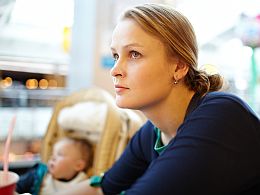What are the risks of having a baby after 40?
 Motherhood is a gift and blessing of nature. It is always a great feeling to be a mommy but there are situation that greatly increases the risk of complications in both mother and child. One of the situations in which pregnancy is considered high-risk is when you are having a baby after 40 years of age.
Motherhood is a gift and blessing of nature. It is always a great feeling to be a mommy but there are situation that greatly increases the risk of complications in both mother and child. One of the situations in which pregnancy is considered high-risk is when you are having a baby after 40 years of age.
Ideally it is recommended to have your first baby before you turn 30. This is because chances of conceiving a child are very low after 40 years of age. Moreover, even with artificial or assisted techniques, the risk of miscarriage is very high and even if the pregnancy is continued to term, it carries a significant risk to overall health of the mother and baby.
Maternal Complications
Having a baby after 40 years of age increases the risk of various health issues or aggravation of pre-existing medical conditions. This includes:
- Women who are having a baby after 40 years of age are at very high risk of developing gestational diabetes and abnormal glucose testing during pregnancy. If the expecting mother is a known diabetic, the risk is very high that her blood sugar levels may get severely impaired.
- Although, any woman can develop gestational hypertension, the risk is higher if you are above 40 years. The chances are fair that you may also develop complications of gestational hypertension like pre-eclampsia and eclampsia.
- With advancing age, the risk of ectopic pregnancy also increases significantly.
- Even with excellent antenatal care, the risk of Cesarean delivery is higher in woman having a baby after 40.
- Other obstetric issues like placental abruption and misalignment are also common.
Fetal Complications
The risk of all genetic issues and problems increases after 40 years of age. This includes Down syndrome, were the risk is approximately 1 in 100. Other issues like mental retardation and congenital anomalies are also seen more frequently in women who conceive after 40. Apart from that, most babies are born pre-maturely or with a low birth weight. Moreover, even after birth, these babies are known to have issues in lactation and are thus more likely to get sick as a result of infections.
How can you minimize the risk of complications if you are having a baby after 40?
It is very important to keep up with all your antenatal checkups and make sure you take all prescribed supplements. Due to high risk of neural tube defects, folate supplementation is very important. You may need more frequent antenatal testing and genetic counseling to avoid genetical or other congenital malformations in your baby. A healthy and nutritious diet is even more essential with an absolute restriction of exposure to cigarette smoking, alcohol and other beverages that may affect fetal growth or development. Moreover, maintain a healthy lifestyle and watch your weight gain during pregnancy to avoid further complications and issues.
Remember to always consult with your doctor!
Reference: http://www.babycenter.com/404_what-are-the-risks-of-having-a-baby-if-im-35-or-older_3127.bc
-
Advertisement

 Facebook
Facebook  Twitter
Twitter  RSS
RSS







